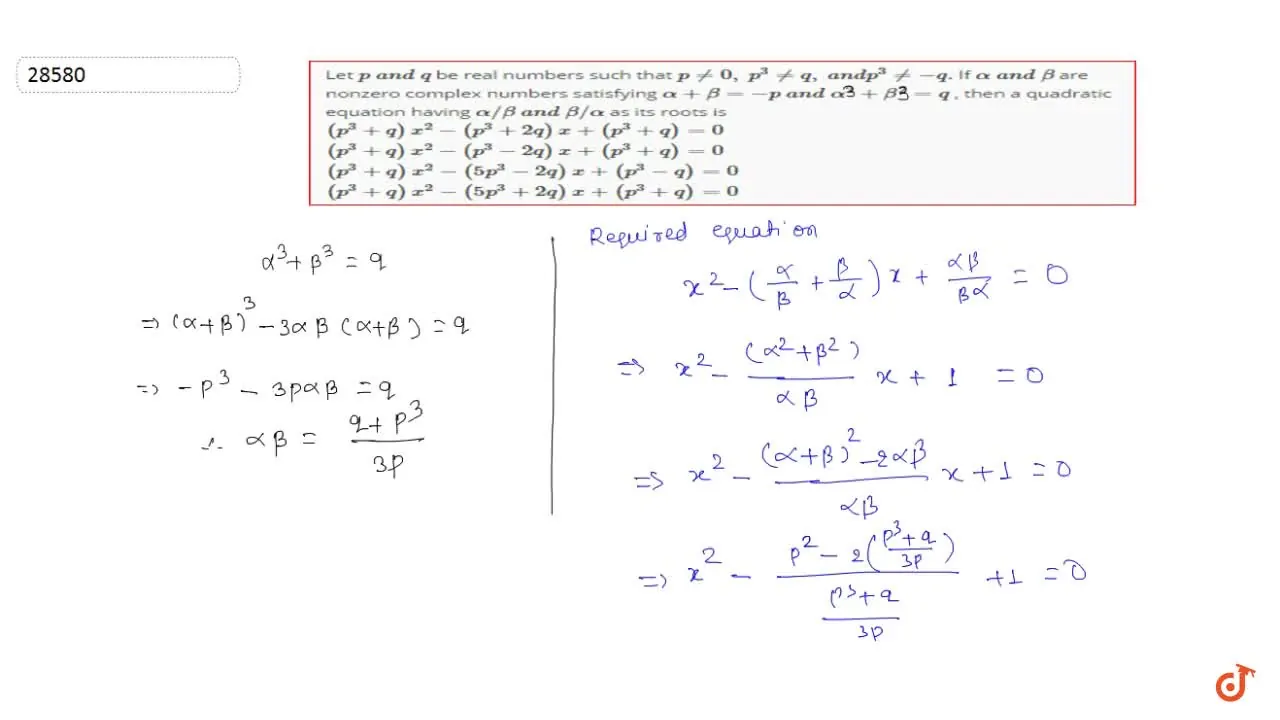Let pandq be real numbers such that p≠0,p3≠q,andp3≠−q. If αandβ are nonzero complex numbers satisfying α+β=−pandα2+β2=q , then a quadratic equation having α/βandβ/α as its roots is A. (p3+q)x2−(p3+2q)x+(p3+q)=0 B. (p3+q)x2−(p3−2q)x+(p3+q)=0 C. (p3+q)x2−(5p3−2q)x+(p3−q)=0 D. (p3+q)x2−(5p3+2q)x+(p3+q)=0
Step by step video & image solution for Let pa n dq be real numbers such that p!=0,p^3!=q ,a n d p^3!=-qdot If alphaa n dbeta are nonzero complex numbers satisfying alpha+beta=-pa n dalpha^2+beta^2=q , then a quadratic equation having alpha//betaa n dbeta//alpha as its roots is A. (p^3+q)x^2-(p^3+2q)x+(p^3+q)=0 B. (p^3+q)x^2-(p^3-2q)x+(p^3+q)=0 C. (p^3+q)x^2-(5p^3-2q)x+(p^3-q)=0 D. (p^3+q)x^2-(5p^3+2q)x+(p^3+q)=0 by Maths experts to help you in doubts & scoring excellent marks in Class 12 exams.
Related Playlists
- BOOK - JEE ADVANCED PREVIOUS YEARCHAPTER - JEE (ADVANCED ) 2020 EXERCISE - SECTION 26videos
JEE (ADVANCED ) 2020
- BOOK - JEE ADVANCED PREVIOUS YEARCHAPTER - JEE (ADVANCED ) 2020 EXERCISE - SECTION 36videos
JEE (ADVANCED ) 2020
- BOOK - JEE ADVANCED PREVIOUS YEARCHAPTER - JEE (ADVANCED) 2020EXERCISE - SECTION-36videos
JEE (ADVANCED) 2020
Similar Questions
Q. Let p and q real number such that p≠0,p2≠q and p2≠−q. if α and β are non-zero complex number satisfying α+β=−p and α3+β3=q, then a quadratic equation having αβ and βα as its roots is
View SolutionLet p and q be real numbers such that p≠0,p3≠qandp3≠−q. If αandβ are non-zero complex number satisfying α+β=−pandα3+β3=q, then a quadratic equation having αβ,βα as its root is
View SolutionLet α, β be two real numbers satisfying the following relations α2+β2=5, 3(α5+β5)=11(α3+β3)
Quadratic equation having roots α and β isView Solutionp3−9p2+18p=0
q3−q2=0View SolutionIf (α+√β) and (α−√β)are the roots of the equation x2+px+q=0 where α,β,p and q are real, then the roots of the equation (p2−4q)(p2x2+4px)−16q=0 are
View SolutionThe number of non-negative integers 'n' satisfying n2=p+q and n3=p2+q2 where p and q are integers
(A) 2
(B) 3
(C) 4
(D) infiniteView SolutionIf (α+√β) and (α−√β) are the roots of the equation
x2+px+q=0, where α,β, p and q are real, then the roots of the equation
(p2−4q)(p2x2+4px)−16q=0 areView SolutionIf sec αandα are the roots of x2−px+q=0, then (a) p2=q(q−2) (b) p2=q(q+2) (c)p2q2=2q (d) none of these
View Solution2x+3y=9(p+q)x+(2p−q)y=3(p+q+1)
View SolutionIf p and q are roots of the equation 2x2−7x+3 then p2+q2=
View Solution


